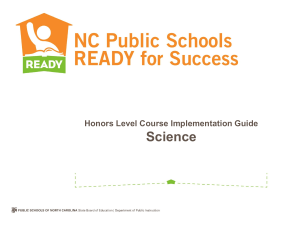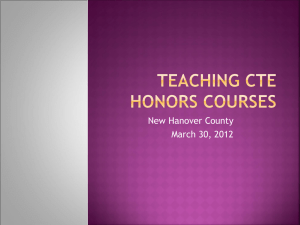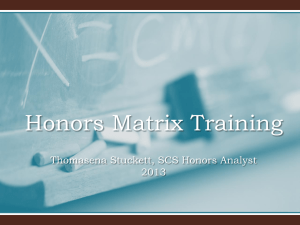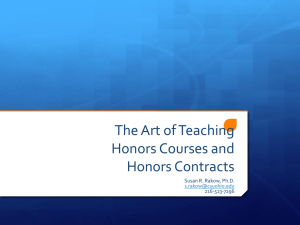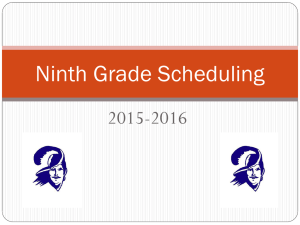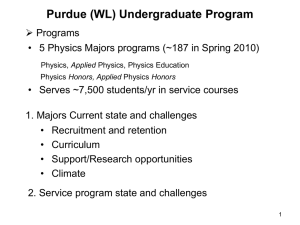Social Studies Implementation PowerPoint for Honors Portfolio
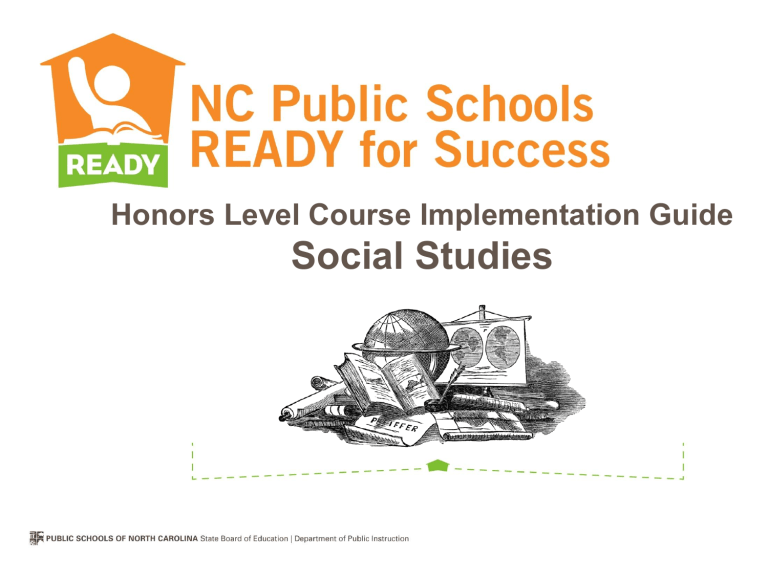
Honors Level Course Implementation Guide
Social Studies
Structure and Content of
The Honors Portfolio
The Honors Portfolio contains three primary sections:
1.
Curriculum Content
2.
Instructional Materials and Methods
3.
Assessment
The first component of each of the three major sections will always be “Teacher Rationale” which provides an explanation for what should be found in a particular section. Greater details of each section follow in the accompanying information within each section.
Section I
“Curriculum Content”
I. Curriculum Content
How is the honors level course adapted and differentiated for advanced learners? How does the honors level curriculum support vertical alignment for college and career readiness?
Honors Level Course Portfolio Evidence must include:
1. Teacher Rationale for Curriculum Content (intentional reflection & philosophy)
2. Standards and Objectives
3. Curriculum Plan (Pacing guides, course syllabus & sequence, curriculum maps, etc.)
I. Curriculum Content
1. Teacher Rationale for Curriculum Content
Must Include:
• An explanation of how the essential standards for the Social Studies course at the Honors level are being taught in greater depth, complexity and rigor than how they are taught at the Standard level. Essential to supporting the teacher ’s rational for the curriculum content are:
– The teacher ’s explanation of content extensions and/or additional objectives selected for the course and listed in the Standards and Objectives section of the Honors Implementation Guide – Section I.2
– Justification based on the emphasis placed upon the quality of the work expected rather than the quantity of work in alignment with the course specific standard
– Evidence that the concepts and conceptual lenses increase in sophistication beyond those used at the Standard level
– Evidence that the Honors level course has an accelerated pace and content
•
• Examples
Resources (Section I.2 – the next part of this first section)
I. Curriculum Content
2. Standards and Objectives Section Must
Include:
A list or abstract outlining specific objectives or clusters from the Common
Core Literacy Standards for History/Social Studies that will be strategic areas of focus
A detailed explanation of how the Common Core Literacy Standards for
History/Social Studies that are used in the Honors level course exceed the expectations of a standard level course.
A list of any Essential Standards/Clarifying Objectives that the teacher, curriculum office or the school ’s Social Studies department has added to the course.
Examples
I. Curriculum Content
An Example of an Extension that might be added to a Honors American History Course
Extension example:
• An Honors American History course might include the case study of “The
Passing of the Frontier: Did it have to happen in order to advance America politically and economically?
”
A case study in history should bring together the two complementary attributes essential to historical comprehension: chronology and historical inquiry. The teacher ’s explanation of the design of a case study should detail how the case study is constructed around one or more value tensions i.e., common wealth versus private wealth, law versus ethics, diversity versus unity, common good versus individual rights, freedom versus equality and isolation versus international involvement.
I. Curriculum Content
An Example of advanced topics and issues that might be added to Honors Courses in Social Studies
Advanced topics example
IN WORLD HISTORY
•
Afghanistan: The Roots of the Problem: Study of the relationship between the United States and Afghanistan during the 1970s and 1980s.
IN AMERICAN HISTORY
• Re-Thinking the War of 1812: Slaves, Indians, and Redcoats on the Southern Frontier
This topic would focus on examining the effort of the British military along the Gulf Coast to win the War of 1812 by abolishing slavery and enlisting thousands of southern slaves and
Indians in the British Colonial Marines.
IN C&E
•
•
•
Undemocratic elements of the Constitution
Recount vs. Audit
Insider trading and Congress
IN ECONOMICS
•
The Economics of Sports
IN ANY HISTORY COURSE
•
Historiography
I. Curriculum Content
An Example of an Essential
Standard that might be added to a Honors Civics and Economics Course
Example: CE.C&G.
#?
Create innovative solutions for social and political problems and various ways to attain those solutions.
I. Curriculum Content
An Example of a Clarifying Objective that might be added to a Honors American History Course
• Essential Standard - AH1.H.6 Understand how and why the role of the
United States in the world has changed over time.
Clarifying Objective - AH1.H.6.1
Explain how national economic and political interests helped set the direction of United States foreign policy from independence through Reconstruction.
Clarifying Objective - AH1.H.6.2
Explain the reasons for involvement in wars prior to Reconstruction and the influence each involvement had on international affairs.
Teacher Added Clarifying Objective Example: AH1.H.6.3 Evaluate the United
States
’ involvement in the solutions to political or economic problems around the globe in terms of advantages and effectiveness.
I. Curriculum Content
Ideas of ways to help extend and develop a honors level course
• Extensions
• Advanced Topics
• Additional Essential
Standards
• Additional Clarifying
Objectives
Beyond The
Standard Goal
I. Curriculum Content
Resources (Listed in Section I.2 of the Curriculum section)
•
(2010). National standards for civics and government . (p. 266).
Calabasas: Center for Civic Education.
•
(2010) National Curriculum Standards for Social Studies: A Framework for
Teaching, Learning and Assessment. Maryland: National Council for the Social
Studies.
• The Civic Mission of Schools http://civicmission.s3.amazonaws.com/118/f0/5/171/1/Guardian-of-Democracyreport.pdf
• AP Central Course Descriptions: http://apcentral.collegeboard.com/apc/public/courses/descriptions/index.html
•
Link to AP Course Home Pages: http://apcentral.collegeboard.com/apc/public/courses/teachers_corner/index.html
•
AP Central Teacher
’s Resources Search: http://sitesearch.collegeboard.org/?q=*&tp=ap&lnd=1
I. Curriculum Content
3. Curriculum Plan
( yearly/semester plans, pacing guides, course syllabus, scope & sequence, curriculum maps, etc.)
Must Include:
• An outline or overview of course content identifying targeted objectives for specified time intervals (e.g., days, weeks, grading periods, etc.) as well as conceptual lenses.
• All items identified in Section I.2 – Standards and
Objectives, clearly identified.
• Evidence that clearly and strongly supports the additional quality point credit that is awarded to students taking and passing the Honors level course
Section II
“Instructional Materials and Methods ”
II. Instructional Materials and
Methods
How is the honors level course taught?
Honors Level Course Portfolio Evidence must include:
1. Teacher Rationale for Instructional Materials and Methods
2. Instructional Materials and Methods (instructional resources, methods, strategies, equipment, and technology)
3. Sample Units, Lesson(s), and Assignments
4. Student Work Samples
II. Instructional Materials and
Methods Portfolio Section
1. Teacher Rationale for Instructional Materials and Methods for Advanced Learners Must
Include:
• A reflective narrative explaining the choice of instructional practices, materials and methods utilized in the honors course
• Focus on the differentiated content objectives
• Explanation of how the content objectives to identified
Instructional Materials and Methods listed in section II.2 differentiate the instruction in this Honors Level Social Studies course from that of the standard level course.
II. Instructional Materials and
Methods Portfolio Section
2. Instructional Materials and Methods
(instructional resources, methods, strategies, equipment, and technology)
Must Include:
• A list of instructional materials used to differentiate the honors course.
• A list of instructional methods used to differentiate the honors course.
• References to units, lessons, and assignments submitted in the following section (II.3 Sample Units,
Lesson(s), and Assignments).
II. Instructional Materials and
Methods Portfolio Section
3. Sample Units, Lesson(s), and Assignments Must Include:
•
One completed concept-based unit that has been listed in the semester/yearly Unit Plan
• At least one assignment/learning experience that provides a detailed description of the evidence from one or more of the instructional strategies that were documented in the
Materials and Methods section
4. Student Work Samples Must Include:
• One or more student work samples for the assignment/learning experience submitted in the Sample Units, Lesson(s), and Assignments section.
• One or more student work samples for each lesson plan submitted in the Sample Units,
Lesson(s), and Assignments section.
•
One or more student work samples documenting student work in real world settings (this will be applicable if the teacher has indicated that students will participate in independent study, project-based learning, service learning or shadowing opportunities).
Section III
“Assessment”
III. Assessment
How is the Honors Level Course assessed?
Honors Level Course Portfolio Evidence must include:
1. Teacher Rationale for Assessment Practices
2. Assessment Practices (grading practices, use of rubrics and/or scoring guides, use of formative and summative assessment)
3. Assessment Samples (pre-assessment, description of formative assessment, and summative assessment)
4. Student Work Assessment Samples
III. Assessment
Portfolio Section
1. Teacher Rationale for Assessment Practices for Advanced Learners Should Include:
• An explanation of how pre-assessment is used to determine prior knowledge of advanced learners.
• An explanation of how the assessment practices address the standards and measure student mastery.
• An explanation of how the performance tasks documented in the Instructional Materials and Methods section of this portfolio are used in this Honors Level Social Studies course.
• An explanation of how criteria are communicated to the students prior to the assessment.
• An explanation of how the assessment data is used to guide student learning and inform instructional practices.
• An explanation of how ongoing feedback through the use of formative and summative assessment is incorporated and used throughout the course.
III. Assessment Portfolio Section
2. Assessment Practices
(grading practices, use of rubrics and/or scoring guides, use of formative and summative assessment)
Must Include:
A reflective narrative which explains the teacher ’s choice of assessment practices and addresses the following:
• Course grading criteria and how it is communicated to students.
• The use of pre-assessment for mastery learning.
• The use of formative assessment and how formative data is used.
• How are authentic and performance assessments/performance tasks used in this Honors Level Social Studies course?
• How are student self-assessment and peer-assessment used in this Honors
Level Social Studies course?
• How are rubrics and scoring guides used in this Honors Level Social Studies course?
III. Assessment
Portfolio Section
3. Assessment Samples
(pre-assessment, description of formative assessment, and summative assessment)
Must
Include:
• Sample assessments for the practices listed in the
Assessment Practices section.
• Evidence of at least one sample Formative Assessment Plan
• At least two different types of summative assessments aligned to the content standards.
• Sample pre-assessments that address different learning styles or provide choices for advanced learners.
III. Assessment
Portfolio Section
4. Student Work Assessment
Samples Must Include:
• The practices listed in Section III.2.
• Samples of actual student assessment work.
– Two to three actual student assessments for the practices that were listed in Section III.2..
– One to two actual performance tasks completed by a student.
(Remember to include the rubric used to score.)
• No student names. (R emove or block out the names of students so that they do not appear on any work samples you submit.
)
Wrap Up & Contacts
Closure
North Carolina Honors Course
Implementation Guide and
Rubric
• State-wide framework
• Local flexibility
• Guidelines for rigor required for honors credit weighting
For Information On The Honors
Implementation Process Contact:
• Michelle McLaughlin
michelle.mclaughlin@dpi.nc.gov
• Fay Gore
fay.gore@dpi.nc.gov

